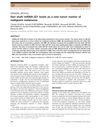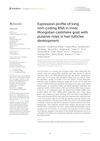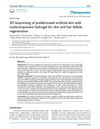 45 citations,
January 2020 in “International Journal of Molecular Sciences”
45 citations,
January 2020 in “International Journal of Molecular Sciences” Some natural compounds may help overcome drug resistance in certain cancers, but more research is needed.
 30 citations,
December 2018 in “Trends in Endocrinology and Metabolism”
30 citations,
December 2018 in “Trends in Endocrinology and Metabolism” Both immature and mature fat cells are important for hair growth cycles, with immature cells promoting growth and mature cells possibly inhibiting it.
 29 citations,
March 2020 in “Stem Cell Research & Therapy”
29 citations,
March 2020 in “Stem Cell Research & Therapy” Fat stem cells from diabetic mice can help heal skin wounds in other diabetic mice.
 23 citations,
January 2018 in “Elsevier eBooks”
23 citations,
January 2018 in “Elsevier eBooks” Nanoemulsions improve stability and delivery of active ingredients in cosmetics for skin and hair care.
 22 citations,
June 2013 in “International journal of molecular sciences”
22 citations,
June 2013 in “International journal of molecular sciences” Stem cell differentiation is crucial for skin barrier maintenance and its disruption can lead to skin diseases.
 18 citations,
September 2020 in “International Journal of Nanomedicine”
18 citations,
September 2020 in “International Journal of Nanomedicine” Both human and animal-derived small extracellular vesicles speed up skin healing equally well.
 16 citations,
June 2021 in “Journal of Dermatological Treatment”
16 citations,
June 2021 in “Journal of Dermatological Treatment” Minoxidil effectively treats hair loss, especially androgenetic alopecia, but needs more research for better understanding.
 16 citations,
December 2018 in “ACS Biomaterials Science & Engineering”
16 citations,
December 2018 in “ACS Biomaterials Science & Engineering” The new patch made of cell matrix and a polymer improves wound healing and supports blood vessel growth.
 11 citations,
May 2018 in “Philosophical Transactions of the Royal Society B”
11 citations,
May 2018 in “Philosophical Transactions of the Royal Society B” New materials help control stem cell growth and specialization for medical applications.
 11 citations,
April 2013 in “Journal of Proteomics”
11 citations,
April 2013 in “Journal of Proteomics” Found different proteins in balding and non-balding cells, giving insight into hair loss causes.
 9 citations,
January 2018 in “Stem Cells International”
9 citations,
January 2018 in “Stem Cells International” Deer antler stem cell fluid helps regenerate tissue better than fat-derived stem cell fluid.
 7 citations,
December 2014 in “Journal of dermatology”
7 citations,
December 2014 in “Journal of dermatology” Hair shaft miR-221 levels can help detect malignant melanoma.
 5 citations,
February 2024 in “Frontiers in bioengineering and biotechnology”
5 citations,
February 2024 in “Frontiers in bioengineering and biotechnology” Electrospun scaffolds can improve healing in diabetic wounds.
 5 citations,
January 2021 in “Biomedicine & Pharmacotherapy”
5 citations,
January 2021 in “Biomedicine & Pharmacotherapy” Policosanol helps treat hair loss by balancing hormones and supporting hair growth.
 4 citations,
January 2022 in “Journal of clinical and translational research”
4 citations,
January 2022 in “Journal of clinical and translational research” Chitosan-based dressings reduce inflammation and speed up skin wound healing.
 3 citations,
May 2023 in “Precision clinical medicine”
3 citations,
May 2023 in “Precision clinical medicine” Researchers found four genes that could help diagnose severe alopecia areata early.
 3 citations,
July 2020 in “International Journal of Molecular Sciences”
3 citations,
July 2020 in “International Journal of Molecular Sciences” SCDSFs from zebrafish embryos are beneficial for treating cancer, regenerating tissues, and improving conditions like psoriasis and alopecia.
 2 citations,
September 2023 in “Frontiers in molecular biosciences”
2 citations,
September 2023 in “Frontiers in molecular biosciences” Inducing ferroptosis in hepatic stellate cells is crucial for treating liver fibrosis.
 2 citations,
September 2022 in “Frontiers in veterinary science”
2 citations,
September 2022 in “Frontiers in veterinary science” Certain long non-coding RNAs are important for the growth of hair follicles in Inner Mongolian cashmere goats.
 1 citations,
October 2023 in “European journal of histochemistry”
1 citations,
October 2023 in “European journal of histochemistry” Ozone and procaine boost the release of healing factors in platelet-rich plasma.
 1 citations,
August 2018 in “bioRxiv (Cold Spring Harbor Laboratory)”
1 citations,
August 2018 in “bioRxiv (Cold Spring Harbor Laboratory)” A new mutation in the TMEM173 gene and a risk allele in IFIH1 cause a unique set of immune-related symptoms.
 February 2025 in “Theranostics”
February 2025 in “Theranostics” 3D bioprinting with special hydrogels can create artificial skin that heals wounds and regrows hair in mice.
 February 2025 in “Clinical Cosmetic and Investigational Dermatology”
February 2025 in “Clinical Cosmetic and Investigational Dermatology” Higher fasting insulin levels increase the risk of androgenetic alopecia.
 December 2024 in “Highlights in Science Engineering and Technology”
December 2024 in “Highlights in Science Engineering and Technology” Stem cells show promise for hair regrowth, but challenges remain.
 May 2024 in “Journal of drug delivery and therapeutics”
May 2024 in “Journal of drug delivery and therapeutics” PRP therapy helps improve hair growth and is safe for treating hair loss.
 January 2024 in “Regenerative Biomaterials”
January 2024 in “Regenerative Biomaterials” Metal organic frameworks-based scaffolds show promise for tissue repair due to their unique properties.
 December 2023 in “International journal of multidisciplinary research and analysis”
December 2023 in “International journal of multidisciplinary research and analysis” SH-MSCs gel can effectively treat alopecia by increasing IL-10 and decreasing TNF-α gene expression.
 November 2023 in “Linköping University medical dissertations”
November 2023 in “Linköping University medical dissertations” Keratinocytes and adipose-derived stem cells can effectively heal difficult skin wounds.
 August 2023 in “International journal of medical science and clinical research studies”
August 2023 in “International journal of medical science and clinical research studies” PRP therapy helps heal pediatric surgical wounds faster and with fewer scars but needs more research for safety and cost.
 December 2021 in “Research Square (Research Square)”
December 2021 in “Research Square (Research Square)” Hair follicle sampling is a feasible method to measure FMRP and FMR1 mRNA levels in children.






























